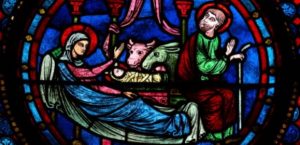By Donato Cabrera│medium.com/@donatocabrera
December 20, 2020

In 1942, while traveling by boat from the United States to England, the British composer, Benjamin Britten, wrote a series of nine songs for three-part children’s choir and harp based on predominantly Middle English Christmas poems from The English Galaxy of Shorter Poems, edited by Gerald Bullett. They were originally intended as separate songs, but Britten would later tie them together with a processional and recessional of the Gregorian chant, Hodie Christus natus est (Today is Christ born) and named the collection, Ceremony of Carols. In 1943, Britten arranged the piece for four-part adult choir and both are now frequently sung.
This is a lovely performance of the original version for three-part children’s choir sung by the Boys of Christ Church Cathedral Choir Oxford.
And here is a beautiful performance of the 1943 four-part version by the S:t Jacobs Vokalensemble —
And here’s an excellent recording of the 1942 version by the King’s College Choir —
Here are the texts for the songs:
1. “Procession”
Hodie Christus natus est:
hodie Salvator apparuit:
hodie in terra canunt angeli:
laetantur archangeli:
hodie exsultant justi dicentes:
gloria in excelsis Deo.
Alleluia!2. “Wolcum Yole!”
Wolcum, Wolcum,
Wolcum be thou hevenè king,
Wolcum Yole!
Wolcum, born in one morning,
Wolcum for whom we sall sing!Wolcum be ye, Stevene and Jon,
Wolcum, Innocentes every one,
Wolcum, Thomas marter one,
Wolcum be ye, good Newe Yere,
Wolcum, Twelfthe Day both in fere,
Wolcum, seintes lefe and dare,
Wolcum Yole, Wolcum Yole, Wolcum!Candelmesse, Quene of Bliss,
Wolcum bothe to more and lesse.
Wolcum, Wolcum,
Wolcum be ye that are here, Wolcum Yole,
Wolcum alle and make good cheer.
Wolcum alle another yere,
Wolcum Yole. Wolcum!3. “There is no rose”
There is no rose of such vertu
As is the rose that bare Jesu.
Alleluia, Alleluia,
For in this rose conteinèd was
Heaven and earth in litel space,
Res miranda, Res miranda.By that rose we may well see
There be one God in persons three,
Pares forma, pares forma.
The aungels sungen the shepherds to:
Gloria in excelsis, gloria in excelsis Deo!
Gaudeamus, gaudeamus.Leave we all this werldly mirth,
and follow we this joyful birth.
Transeamus, Transeamus, Transeamus.
Alleluia, Res miranda, Pares forma, Gaudeamus,
Transeamus.4. “That young child”
That yongë child when it gan weep
With song she lulled him asleep:
That was so sweet a melody
It passèd alle minstrelsy.The nightingalë sang also:
Her song is hoarse and nought thereto:
Whose attendeth to her song
And leaveth the first then doth he wrong.5. “Balulalow”
O my deare hert, young Jesu sweit,
Prepare thy creddil in my spreit,
And I sall rock thee to my hert,
And never mair from thee depart.But I sall praise thee evermoir
with sangës sweit unto thy gloir;
The knees of my hert sall I bow,
And sing that richt Balulalow!6. “As Dew in Aprille”
I sing of a maiden
That is makèles:
King of all kings
To her son she ches.He came al so stille
There his moder was,
As dew in Aprille
That falleth on the grass.He came al so stille
To his moder’s bour,
As dew in Aprille
That falleth on the flour.He came al so stille
There his moder lay,
As dew in Aprille
That falleth on the spray.Moder and mayden
was never none but she;
Well may such a lady
Goddes mother be.7. “This Little Babe”
This little Babe so few days old,
Is come to rifle Satan’s fold;
All hell doth at his presence quake,
Though he himself for cold do shake;
For in this weak unarmèd wise
The gates of hell he will surprise.With tears he fights and wins the field,
His naked breast stands for a shield;
His battering shot are babish cries,
His arrows looks of weeping eyes,
His martial ensigns Cold and Need,
And feeble Flesh his warrior’s steed.His camp is pitchèd in a stall,
His bulwark but a broken wall;
The crib his trench, haystalks his stakes;
Of shepherds he his muster makes;
And thus, as sure his foe to wound,
The angels’ trumps alarum sound.My soul, with Christ join thou in fight;
Stick to the tents that he hath pight.
Within his crib is surest ward;
This little Babe will be thy guard.
If thou wilt foil thy foes with joy,
Then flit not from this heavenly Boy!8. “Interlude” (harp solo)
9. “In Freezing Winter Night”
Behold, a silly tender babe,
in freezing winter night,
In homely manger trembling lies
Alas, a piteous sight!The inns are full; no man will yield
This little pilgrim bed.
But forced he is with silly beasts
In crib to shroud his head.This stable is a Prince’s court,
This crib his chair of State;
The beasts are parcel of his pomp,
The wooden dish his plate.The persons in that poor attire
His royal liveries wear;
The Prince himself is come from heav’n;
This pomp is prizèd there.With joy approach, O Christian wight,
Do homage to thy King,
And highly praise his humble pomp,
wich he from Heav’n doth bring.10. “Spring Carol”
Pleasure it is to hear iwis the Birdès sing,
The deer in the dale, the sheep in the vale,
the corn springing.God’s purvayance For sustenance.
It is for man.Then we always to him give praise,
And thank him than.11. “Deo gracias — Adam lay i-bounden”
Deo gracias! Deo gracias!
Adam lay i-bounden, bounden in a bond;
Four thousand winter thought he not too long.Deo gracias! Deo gracias!
And all was for an appil, an appil that he tok,
As clerkès finden written in their book.Deo gracias! Deo gracias!
Ne had the appil takè ben, the appil takè ben
Ne haddè never our lady a ben hevenè quene.Blessèd be the time that appil takè was.
Therefore we moun singen.
Deo gracias!12. “Recession”
Hodie Christus natus est,
hodie Salvator apparuit,
hodie in tera canunt angeli,
laetantur archangeli:
hodie exsultant justi dicentes,
gloria in excelsis Deo.
Alleluia!
